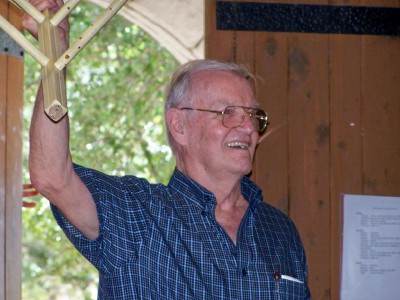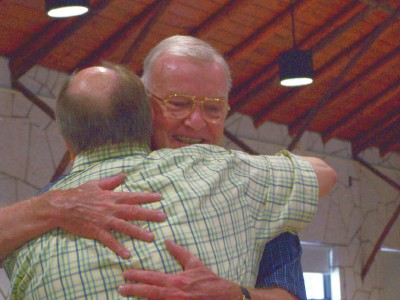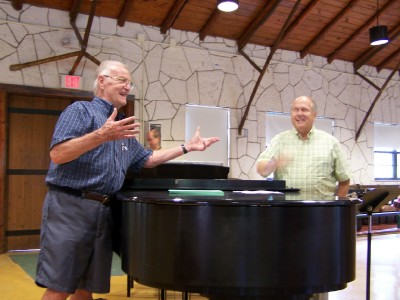 Dr. Robert R. Ball
Dr. Robert R. Ball
FROM
A
N
X
I T O
E
T F A I T H
Y ==========
Sermon by Dr. Robert R. Ball, March 7, 1971
Block 2
F R O M
A
N
X
I T O
E
T
Y F A I T H
=========
Scripture: Mark 9:14-29
A Sermon by
Dr. Robert R. Ball
Memorial Drive Presbyterian Church
Houston, Texas March 7, 1971
Probably you have never had an epileptic son. Probably you
have never watched while one more dear to you than your own life
threshed helplessly on the ground – his face distorted, his
muscles binding, his mind obliterated with agony – and there is
nothing, absolutely nothing, you can do to help. But that doesn’t
mean you have never known anxiety. In some shape or form,
Anxiety belongs to all of us.
Anxiety is an emotion we experience when we fear that
something horrible is going to happen, and it seems to us that we
are helpless to do anything about it. Anxiety is what a father feels
when he can’t make sense out of the junior high level of the new
math although he has always prided himself in his mathematical
ability. Anxiety is what a man feels when he has spent 25 years
building a professional reputation and then a recession comes
along and he can’t find work. Anxiety is what a mother feels when
she has worked at being a good mother, but her kids rise up to
defy everything she holds precious. Anxiety is what a student feels
when he has been told that he can never be anything without a
good education, and he fears he can’t make it in solid geometry.
What is common to each of these illustrations is that the person
involved is evaluating himself and his worth on the basis of what
situations and persons around him seem to be indicating about
him. These situations and persons make him feel unsafe and
unable to cope with life. This way of looking at ourselves always
breeds anxiety.
When Jesus came down from the glorious spiritual experience
which he and his disciples had shared on the Mount of
Transfiguration, he was greeted by a scene that was overflowing
with anxiety. The father was anxious because of his son’s horrible
illness and his total inability to do anything about it. The disciples
were anxious because they had tried their best to help the boy,
but they could do nothing. And besides, a jeering crowd had
gathered to mock the disciples because of the apparent
weakness of their religion.
I.
It must have seemed to Jesus that all of his living with these
disciples and all he had said to them meant nothing. They had it all
exactly backwards.
“O faithless generation, how long am I to be
with you? How long am I to bear with you?”
Jesus had tried so hard to show them. “Do not measure
yourselves by the standards of the world! The only evaluation that
will allow you to function at anywhere near your full capacity is the
one you get from God, being who he says you are.”
This truth is so obvious that it is amazing that we miss it so
consistently. My first pastorate was in a small town in Oklahoma.
It was a warm and accepting congregation. They soon made me
feel that I was wanted and appreciated. A year or so after my
arrival, I was invited to preach one Sunday in the First Presbyterian
Church in Tulsa, a congregation of more than 5,000 members.
Talk about anxiety, I had it! What if I made a complete fool of
myself? What if they were embarrassed that they had asked me?
What if? What if? It’s obvious that my confidence depended on
my surroundings. In Bristow I was more or less at ease, but in
Tulsa I was petrified. Did whatever capability I had leave me in the
course of traveling those 40 miles?
Fritz Perls, founder of the Gestalt system of therapy, writes:
“Maturity is the transcendence from
environmental support to self-support.”
My immaturity was certainly showing for I was stuck on my
environmental support. But how can a realistic person move up to
the level of continuing self-confidence in a world where epilepsy
and rejection and all kinds of failure and death can happen at any
moment – and there is little or nothing we can do to stop them?
There is only one way: Believing!
Our worth and capability is not determined by the apparent
success or failure we are experiencing in the situation immediately
around us. The confidence we need for living is found in our faith
that we are who God says we are: capable and responsible
persons through whom he works to accomplish his good
purposes. The ONLY way we gain that confidence is by believing
it.
The parent who is stuck with how his children sometimes make
him feel, the student who is stuck with how his teachers sometimes
make him feel, the cripple who is stuck with how his infirmity
sometimes makes him feel – all are stuck with a disabling anxiety.
Even when we do seem to be successful by the world’s standards,
a voice inside of us whispers, “Next time you may not be, and then
all your confidence and power will be gone.” Even success can be
anxiety-producing, making us fear we cannot do it again. Our faith in
God’s faithfulness is the only basis for real self-confidence.
II.
But faith is not a cop-out! Those who give up on life and
themselves and say, “I’m not going to try to do anything. God will
provide,” are not honoring God or themselves. Their religion has
become a hiding place, very much like those who hide behind
drugs or alcohol.
William Carey who was to become the first English-speaking
missionary to a foreign land, asked for financial support from his
church. They refused, saying, “When God wants the people in
India saved, he will do it.” That’s not faith, in spite of the fact that
they used the name of God. That’s ducking out on Christ’s clear
call to us to carry his gospel into all the world.
God creates us to be responsible. Jesus made this very clear
to the father in this scripture. His son’s illness was destroying his
own life as well as his son’s, and there seemed to him nothing he
could do about it. His anxiety had him paralyzed – unable to do
even what he was capable of doing. He had given up. You can
hear the total despair in the words he spoke to Jesus. “If you can
do anything, have mercy on us and help us.” Jesus said back to
him immediately, “If YOU can! All things are possible to those who
believe.”
The meaning is clear. Faith in God does not replace our ability
or our responsibility. Faith in God gives us the strength and
confidence to live and act as the responsible persons we are.
To assume that we can handle life just fine all by ourselves is a
lie, and life has a way of reminding us of that again and again. But
to assume that we are to be passive nothings while God moves us
around like checkers on a playing board is also a lie. God calls us
to choose, to care, and to love, that his will be done through us.
Everything within his purposes of love is possible to those who
believe.
Tragedy may come our way as it did to Jesus, but he was not
destroyed by it because he did not allow what was happening
around him to control him. Even in the midst of total despair on the
cross, he addressed his cry of agony to the God on whom he
depended to give his life meaning; and he was not defeated. Faith
is not an escape from pain, but it does remove the anxiety that
leaves us in paralyzed helplessness. Faith allows us to live and to
act appropriately and creatively.
III.
This faith which alone makes life possible is not an
achievement won by those who have earned it through spiritual
success. Faith is trust in the faithfulness of God – in his power and
in his good purposes for us and for his world.
The father in this scripture was quite honest about how difficult
it was for him to trust. he wanted to trust, yearned to trust; so much
bad had happened in his life that all he could say was, “Lord, I
believe; help my unbelief.”
But that was enough. His son was healed. The father’s
openness and honesty was a clear channel through which God’s
power could work. Notice how much trust there was even in his cry
that his faith was weak. The father did not decide in advance what
the outcome would have to be for his faith to be confirmed. His
appeal to Jesus was, “If you can do ANYTHING…” He did not
pretend that he had been so good or spiritual that God owed him
a miracle. When he spoke to Jesus what he asked for was
“mercy.” Neither did the father try to maintain a public image of
himself as strong and confident. He openly confessed his need.
“Please help us!” Did you catch that? “Help US!” The father knew
that the problem was not just his son’s illness. He needed healing
too for his painful, paralyzing anxiety.
Faith is trust – the trust that God can help and that he wants to
help. When we are willing to admit that we can’t cut it by ourselves,
and willing to trust that the God who gives us life will also give us
what we need to live it, then we put ourselves in a position where
help can be given. AND IT IS GIVEN!
Life opens up when our anxious mistrust is replaced by
believing trust. Think of it! Picture it in your mind! See yourself
living! God PROMISES to work for good in everything WITH those
who love and trust him. It’s a promise!
We were not created to live without God, and our every effort to
do so will only lead to increasing anxiety. But it doesn’t need to be
that way! Kenneth Phifer, pastor of the St. Charles Avenue
Presbyterian Church in New Orleans, in the booklet he wrote for
the Women of the Church to use in Bible study, says,
“Faith as trust it the place at which God
becomes real to us and where the kind
of relationship that is marked by creative
confidence in life itself comes into being.”
When the healing was over and the father and son had gone
off to a new kind of life, and the crowd dispersed because all the
excitement was over, Jesus’ disciples were still worrying about
why they had not been able to help the boy. Jesus had told them
that they had the power to heal diseases, but they had tried every
trick they knew and none of it worked. They wanted to know why
not. Jesus told them,
“This kind cannot be driven out
by anything but prayer.”
Perhaps you have been sitting in church for years hearing all
about this wonderful power but unable to find it. Maybe this is why
not. How can we expect to get our signals as to who we are from
God, rathe trthan from the world around us, if we never make the
effort to spend some time with him? The world is so close and so
loud that its evaluation of us is bound to dominate our thinking
unless we consciously place our confidence somewhere else.
What I am saying is this: If you want to live in God’s evaluation of
you and in his power, go to him and ask for it in whatever words you
may have.
If a little voice keeps saying, “But I don’t believe,” don’t worry
too much about that. Just keep going anyway. The best that any of
us can do, really, is to say, “Lord, I believe. Help my unbelief.” But,
thank God, that is enough.
Fred Beuchner writes,
“Seek and you will find – this power of
God to heal, to give peace and, at last,
something like real life, so that little by
little, like the boy, you can get up. Yes,
get up. But we must seek – like a child
at first, like playing a kind of game at first
because prayer is so foreign to most of
us. It is so hard and it is so easy. And
everything depends on it. Seek. Ask. And
by God’s grace we will find. In Christ’s
name and with his power I can promise
you this.”
 |
 |
 |